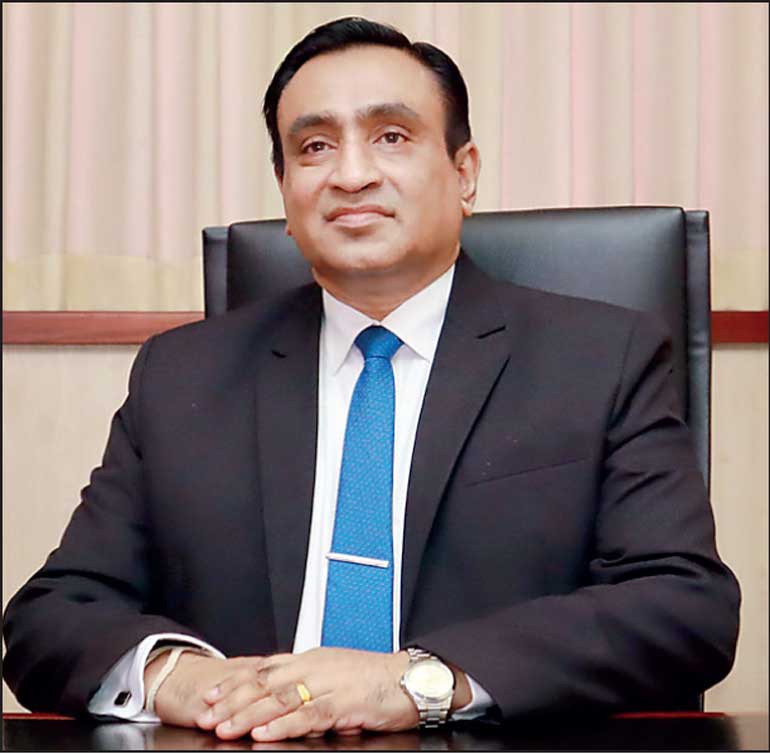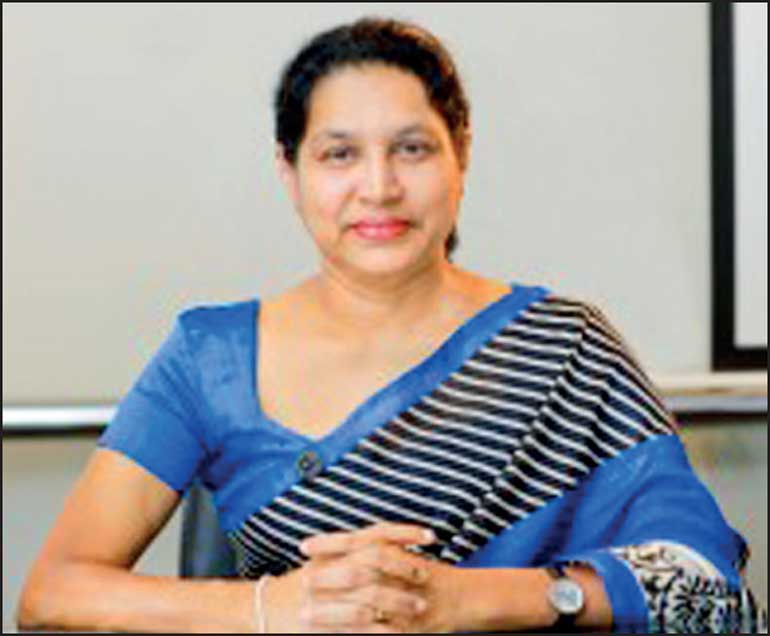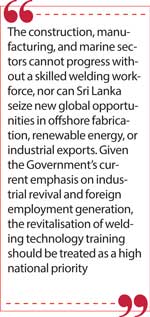Sunday Feb 22, 2026
Sunday Feb 22, 2026
Friday, 31 October 2025 00:24 - - {{hitsCtrl.values.hits}}

Ministry of Education Secretary Nalaka Kaluwewa

Ministry of Skills Development and Vocational Training Education Additional Secretary Himali Athaudage
 Following is a letter to Ministry of Education Secretary Nalaka Kaluwewa and Ministry of Skills Development and Vocational Training Education Additional Secretary Himali Athaudage, advising the formation of an Advisory Board for the revival of welding technology in the vocational training sector
Following is a letter to Ministry of Education Secretary Nalaka Kaluwewa and Ministry of Skills Development and Vocational Training Education Additional Secretary Himali Athaudage, advising the formation of an Advisory Board for the revival of welding technology in the vocational training sector
Dear Sir/Madam,
Proposal for the establishment of an Advisory Board for the revival of welding technology in Sri Lanka’s vocational training sector
Background
At the recent Skills Expo Exhibition held at Temple Trees, an important discussion unfolded concerning the alarming and egregious decline in the quality and performance of welders produced by Sri Lanka’s vocational training institutes, including TVEC, NAITA, VTA, and Technical Colleges.
The session, moderated by Mr. Manjula Vidanapathirana, Director of TVEC, revealed broad consensus among participants that the standard of welding graduates has significantly deteriorated over the last few decades, undermining both local industrial productivity and foreign employment prospects.
Present situation
Despite Sri Lanka’s long-standing investment in vocational training infrastructure, the output quality of welders has failed to meet the needs of the manufacturing and construction sectors.
The situation has reached a critical stage, with local industries compelled to import welders from India and China, while foreign markets—including the UK, South Korea, Israel, Japan, the Middle East, Romania, Thailand, and Singapore—are actively recruiting qualified welders.
This shortfall is not new. As far back as 1999, during the Shell Terminal Project at Muthurajawela, Sri Lanka was compelled to import 250 welders from Gujarat, India due to the lack of skilled local manpower. Two decades later, the problem persists despite the expansion of vocational institutions. The local manufacturing and construction sectors are badly handicapped due to non-availability of skilled welders.
 Causative factors
Causative factors
An Australian research study on Sri Lanka’s vocational training performance recently identified the following weaknesses in the country’s welding education and training model:
These factors collectively explain why only about 5% of welders from national institutions are deemed competent by foreign employers for foreign job market. As a nation, we should be ashamed of dispatching our sisters as housemaids to foreign market for a meagre salary of $ 400 per month, whereas a skilled welder’s initial salary is hovering around $ 2,500. This itself discloses the importance of the welding industry and the potential job opportunities for the welders.
Urgent national need
The cumulative effect of these deficiencies and weaknesses has now become a national economic and financial issue. The construction, manufacturing, and marine sectors cannot progress without a skilled welding workforce, nor can Sri Lanka seize new global opportunities in offshore fabrication, renewable energy, or industrial exports.
Given the Government’s current emphasis on industrial revival and foreign employment generation, the revitalisation of welding technology training should be treated as a high national priority.
Proposed way forward: Establishment of an Advisory Board
It is proposed that the Ministry of Skills Development and Vocational Training establish an Advisory Board for Welding Technology to:
1. Review and evaluate the current training curricula and assessment standards of all welding-related programs under TVEC, NAITA, VTA, CGTTI, and Technical Colleges, etc.
2. Recommend reforms to align local training with international welding qualification systems (such as ISO 9606, AWS, and ASME standards).
3. Design a national apprenticeship framework in collaboration with private industry and export employers.
4. Advise on accreditation, certification, and instructor training to ensure continuous quality improvement.
5. Facilitate partnerships with international institutions (e.g., TWI UK, Lincoln Electric, or Australian TAFE) for knowledge transfer and joint certification.
Institutional structure
Recent commitments
It is noted with appreciation that Hon. Nalin Hewage (Deputy Minister of Vocational Training) and Hon. Chathuranga Abeysinghe (Deputy Minister of Skills Development) have expressed strong support to strengthen welding technology training during their visit to the vocational training stalls at the Skills Expo.
This proposal seeks to translate that commitment into action through a formal institutional mechanism—the Advisory Board—to ensure long-term reform and measurable improvement.
Conclusion
The creation of a National Advisory Board for Welding Technology is not merely an administrative step but a strategic national investment. It will:
Given the urgency of the matter and its implications for industrial development and foreign employment, I respectfully request an opportunity to discuss this proposal in person, to brief the Ministry on the current industry realities and possible pathways to revival, on a matter of utmost priority.
The issues what I enumerated above were adequately dealt with in my article in an editorial page of a leading paper on the 30th September 2023, which I am forwarding herewith for your kind reference.
In case, you need any clarifications, I could be contacted on 074/2122137 or email [email protected].
Yours faithfully,
J.A.A.S. Ranasinghe,
Productivity Specialist and Management Consultant
Copy to:
Dr. Harini Amarasuriya, Prime Minister, Minister of Higher Education and Vocational Training
Hon. Sunil Handunneththi, Minister of Industries
Hon. Nalin Hewage, Deputy Minister of Vocational Training
Hon. Chaturanga Abeysinghe, Deputy Minister of Industries
Chairman, Export Development Board
Chairmen of TVEC, VTA, NAITA, Technical Colleges, CGTI
Chairman, Sri Lanka Bureau of Foreign Employment/Sri Lanka Foreign Employment Agency
Members of the Panel who served in the forum of the Skills Expo forum at the Temple Trees